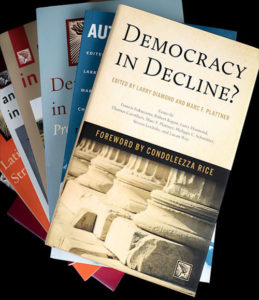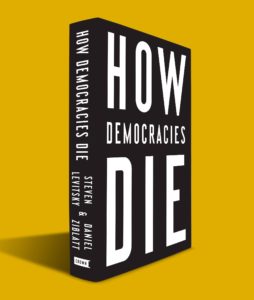 Are the causes of democratic erosion the same in the advanced liberal democracies as seen in Venezuela, Hungary, Turkey, Spain before the Spanish Civil War, and Germany and Italy before World War II?
Are the causes of democratic erosion the same in the advanced liberal democracies as seen in Venezuela, Hungary, Turkey, Spain before the Spanish Civil War, and Germany and Italy before World War II?
Valerie Bunce, a scholar on post-Soviet politics at Cornell University, told her fellow social scientists, gathered in Ithaca to discuss the future of American democracy, that she saw something that smelled like the fall of Communism in the last century, the New York Times reports.
“We were looking at this in the 1980s — and if you said then the Soviet Union would break up, people didn’t believe you,” she told two colleagues, who responded with an uneasy laugh. “I’m just trying to give you an idea of the kind of things that can happen here.”
But Hadas Aron, a faculty fellow at New York University, said there were large differences between the democratic crises in countries like Hungary or Poland and what is going on in [advanced liberal democracies like] the United States. Those countries were far more polarized to begin with. “Democracy dies when there is no support for democracy, when people don’t believe in it,” she told the Times.
 “Today democracies don’t die at the hands of generals, but at the hands of elected leaders — presidents, prime ministers,” said Harvard’s Steven Levitsky. co-author of How Democracies Die. “Many citizens are not fully aware of what’s happening until it’s too late.”
“Today democracies don’t die at the hands of generals, but at the hands of elected leaders — presidents, prime ministers,” said Harvard’s Steven Levitsky. co-author of How Democracies Die. “Many citizens are not fully aware of what’s happening until it’s too late.”
The real threat to democracy comes from a weak state of hollowed-out institutions and battered and belittled public servants, no longer able to uphold the ever more fragile guardrails of our democracy, argues William J. Burns, president of the Carnegie Endowment for International Peace, who previously served as U.S. deputy secretary of state.
 We’ve all too often taken for granted our institutions and their capacity to uphold the rule of law and sustain our democracy, he writes for the Atlantic. We’ve certainly taken for granted the significance of career expertise and commitment at the State Department to help ensure continuity through administrations, manage crises, and promote American interests. After decades of dysfunction and drift, and now three years of unilateral diplomatic disarmament, it would be foolish to ignore the growing risks of a weak state, adds Burns, a board member of the National Endowment for Democracy, the Washington-based democracy assistance group.
We’ve all too often taken for granted our institutions and their capacity to uphold the rule of law and sustain our democracy, he writes for the Atlantic. We’ve certainly taken for granted the significance of career expertise and commitment at the State Department to help ensure continuity through administrations, manage crises, and promote American interests. After decades of dysfunction and drift, and now three years of unilateral diplomatic disarmament, it would be foolish to ignore the growing risks of a weak state, adds Burns, a board member of the National Endowment for Democracy, the Washington-based democracy assistance group.







